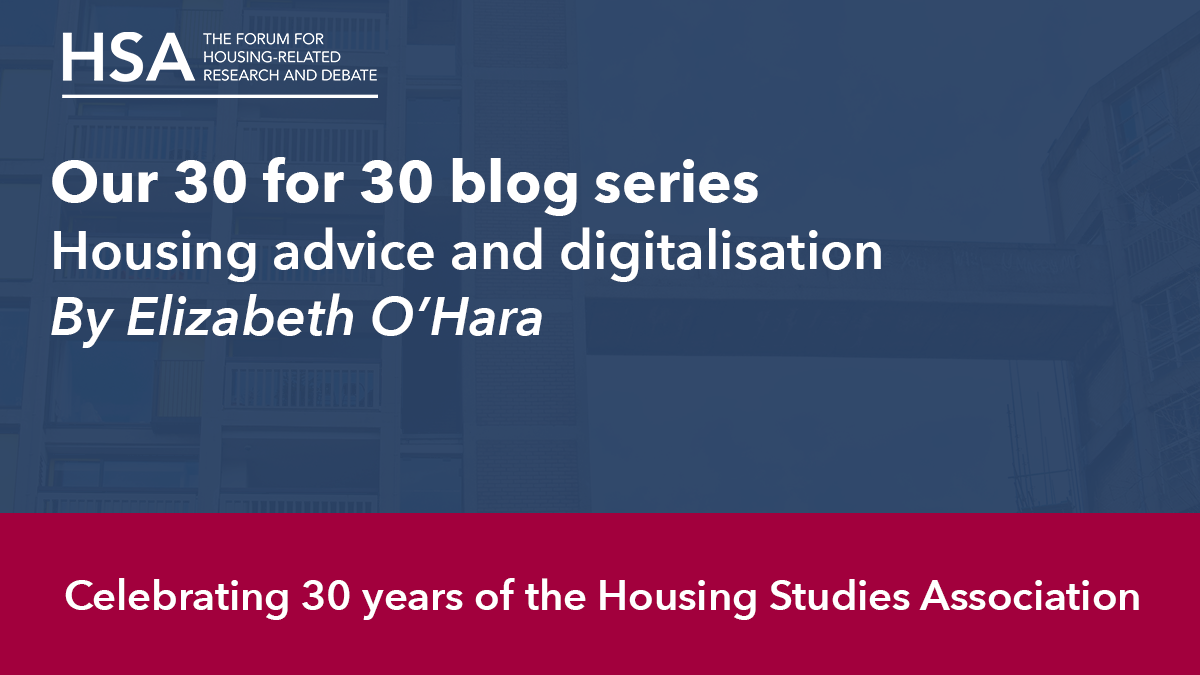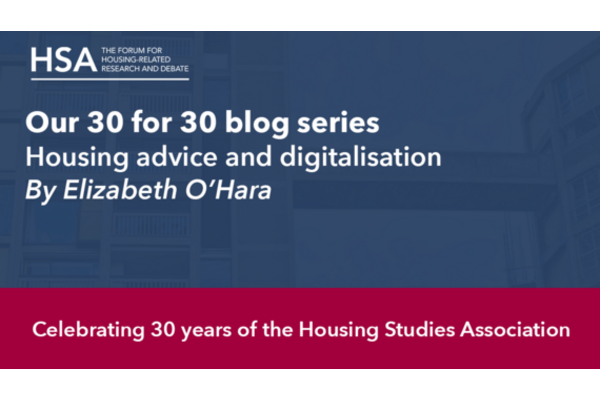
Elizabeth O'Hara considers new evidence concerning housing advice and digitisation in the context of the pandemic
Elizabeth O’Hara is a housing practitioner with a background in the housing advice sector. She also worked for Shelter where she developed policy on social welfare law advice and channel shift. Elizabeth is a member of the Housing Studies Association Executive Committee. In this blog, she considers new evidence concerning housing advice and digitisation in the context of the pandemic.
Housing advice & digitisation
This Autumn the Ministry of Justice will be moving forward with the next phase of its national Digital Supportservice for those who need help in accessing justice online. Social welfare law advisers are watching closely.
The advice sector delivers independent advice services to those on low incomes, helping clients to understand their rights and access justice. In housing terms, this includes dealing with disrepair, evictions and homelessness. Housing advice agencies have traditionally been rooted in the communities most likely to experience disadvantage. The backbone of these services has been face-to-face advice and casework, funded by legal aid. The shift towards remote advice delivery has posed challenges, both for advice providers and for those they serve. More recently, the pandemic has increased the demand for social welfare law advice and simultaneously necessitated that it be provided from a distance.
Since 2012 there has been a repositioning of funding away from face-to-face and towards telephone and online provision. The first Government Digital Strategy (2013) introduced a ‘digital by default’ approach explicitly linked to cost savings. It was launched alongside major departmental budget cuts. The Ministry of Justice (MoJ) embraced the digital turn, encouraged by a 30% reduction in its own budget. It sought savings from legal aid, paring social welfare advice to the bone. Many areas of housing law became ineligible for advice. Remote channels were introduced, some compulsorily; the walk-in, face-to-face advice in the community that had long since enabled access to justice for disadvantaged communities was hardest hit.
In 2016, the MoJ launched Transforming Our Justice System, a programme of reforms to move court and tribunal hearings online. It also introduced a 4 year pilot of Digital Support for those needing to access their rights but unable to use an online justice system without support. This pilot ends in this month and the evaluations[1] show there are important learnings to consider.
Digital Support providers have identified that those assisted often need and highly value legal and procedural advice[2]. Form-filling for online court applications and assistance with typing is Digital Support, but the way in which a form is completed, the case made, the issues raised is the stuff of legal advice. The Digital Support pilot experiences were mirrored by findings from an Administrative Justice Council (AJC) survey. Published at the onset of the pandemic, the report considered the impact of digitised justice on community advice services and people they serve[3]. It identified high levels of need for digital assistance as distinct from legal assistance. While there is evidence of the need for both, there is concern around a blurring of the two and also a question as to how meaningfully they can be separated.
As the pandemic forced a shift to remote advice provision, the AJC followed up with a further survey to gauge the impact on providers and clients. The emerging findings make sobering reading[4]. Service delivery under the pandemic has transferred mainly to the telephone. Advice providers report new categories of need as many seek advice for the first time. However, the vulnerable communities traditionally served by the sector have disappeared, unable to channel shift. The infrastructure of the advice sector has been compromised by years of underfunding making it difficult for it to scale up in response to increased demand; neither can it easily switch to computer-based service delivery or absorb the need to support clients digitally without adequate funding.
Evidence shows that digital transformations in government do not always achieve the quality of service or efficiencies they promise and power balances can be ignored[5]. Digital Support was meant to ensure that no one was left behind. Yet without social welfare law advice, it is not enough to ensure access to justice. This emerging evidence points to socially and digitally excluded groups whose needs are not being met. The way forward must include improved funding to enable face-to-face as well as remote social welfare advice andappropriate Digital Support.
[1] HMCTS Digital Support Service: Implementation Review (2020) and HMCTS Digital Support: Phase 4 Addendum Report (2021)
[2] For further analysis of the Digital Support pilot, see Public Law Project’s report (2021) Digital Support for HMCTS Reformed Services: What we know and what we need to know
[3] Diane Secchi (2020), Digitisation and Accessing Justice in the Community
[4] Naomi Creutzfeldt & Diane Secchi (2021) Social welfare [law] advice provision during the pandemic in England and Wales: a conceptual framework, Journal of Social Welfare and Family Law, 43:2, 153-174
[5] See Paul Henman (2018): Of algorithms, Apps and advice: digital social policy and service delivery, Journal of Asian Public Policy, 12:1, 71-89







